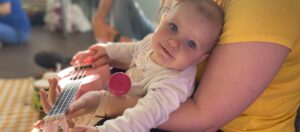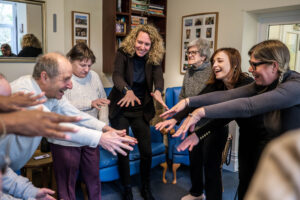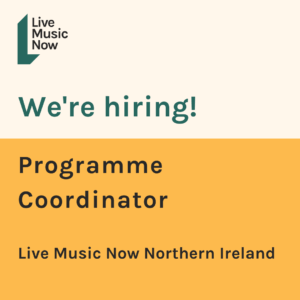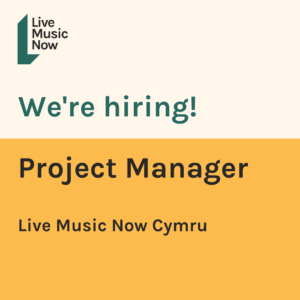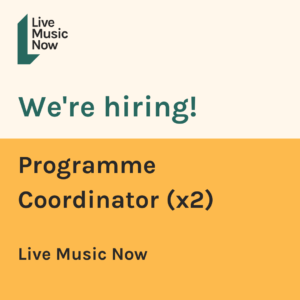
When LMN was founded by Yehudi Menuhin and Ian Stoutzker in the late 1970’s, the trajectory of a successful professional musician was very different to the portfolio careers that are so commonplace in the industry these days. Outreach work was in its infancy, and most LMN musicians had little knowledge of the audiences they were to perform to before they arrived at a venue.
These days, young musicians know a lot about LMN and what is involved in outreach work even before they audition. Many music colleges and conservatoires include information about us in their undergraduate studies and so, at a philosophical level, the starting point for our musicians is increasing every year. However, the basic criteria for joining Live Music Now has remained the same for nearly four decades: musicians must have a very high standard of musicianship alongside the ability and desire to generously communicate their music and personality to other people.
We have about 350 musicians on the scheme at any time, all around the UK, who stay with us for four or five years, before making way for new musicians to join us. We just conducted our annual survey amongst our musicians, collecting information about their training needs and their impressions of our organisation; and amongst leavers, asking about their hopes for the future, and advice to future generations. The results make for interesting reading.
Many people outside LMN imagine our musicians to be mostly from a classical music background, but in fact only 64% of our musicians consider themselves ‘classical’ musicians. The others are drawn from folk, jazz, world and pop music. Our audition panels always involve experts from those genres being considered, to ensure that we always represent excellence, and we are very grateful to many eminent musicians who volunteer to help us with this.

Musicians Development Director, Nina Swann and volunteer Rebecca Williams have been poring over the results of this year’s musicians’ surveys and will be responding to suggestions and sharing results with all current and alumni musicians. Here’s a snapshot of what they found:
Musicians mid-way through their time on the scheme were asked to comment on how the LMN-organised Training Courses impacted on their work.
‘Really useful tips for working specifically in SEN settings, in terms of structure, warm up activities, use of themes etc.’ Anna Ter Haar, Vespertine Duo
‘We were given lots of ideas about how to structure and prepare our workshops to specific audiences’ Ruth Hopkins, K'antu Ensemble
‘I've found that the communication side of the training has impact my work making me concentrate on clarity and incorporating hand gestures properly’ Aron Kyne, Musala Trio
‘In relation to work with older people they have made us very aware of the fact we are going into their home.’ Dan Walsh, The Absentees
‘It was great to listen to other groups, their experiences and what kind of repertoire they used. It was also useful to understand more about Dementia, scientifically and musically.’ Rhiannon Pritchard
Musicians leaving the scheme were asked how they had developed as performers since joining LMN and how their work for LMN had informed this development.
'I have found a real passion for outreach work, it is amazing to witness the positive effect of music on others. I am now studying for a music therapy degree to further learn how to use music for therapeutic benefits, and it is very unlikely I would be on this path in life without the invaluable experience I gained on the LMN scheme.’ Sophie Crawford, Goodman Quartet
‘LMN has given me the confidence to present myself and my music to any audience and find a way to engage them. It also gave me an opportunity to experiment with material and widen my repertoire.’ Jamie Smith
‘I learnt how to be more conscious about the audience and how the music affects them. Sometimes simple gestures and explanation of the music can open up a lot of dialog between the musicians and audience members. I had grown as a performer since joining LMN. I strongly feel performances I have done for LMN have been part of my growth.’ Maciek Pysz, Alice Zawadzki Duo
The musicians were asked if they felt that their work with LMN had given them new skills that would broaden their employment opportunities as a freelance musician. All respondents felt it had.
‘I feel so much more comfortable and open as a performer, able to play in a much freer way. I have had the opportunity to play alongside musicians from different genres (African drumming, folk), which has further informed and broadened my musical awareness and means of expression.’ Sophie Crawford, Goodman Quartet
‘Yes. I feel more "employable" from an educational point of view in general and also feel more relaxed with turning up and having to transpose random duets/pieces not for our usual combination etc which perhaps previously would have stressed me out a little.’ Chris Goodman, Goodman Quartet
Musicians leaving the scheme were also asked what they would say to a musician early on in their career who is thinking of auditioning for LMN.
‘It's an excellent opportunity for any musicians to broaden their experience as a musician, performer and human being. The experiences I have had through LMN couldn't have happened elsewhere and I felt I was exposed to numerous situations which helped me grow as performer. I would strongly recommend to any young musician to join the scheme, not only for the financial benefits of extra work, but more importantly to broaden their experience as a performer. I strongly feel LMN is a unique opportunity and I will always remember my time on the scheme and all the inspiring situations I have been part of.’ Maciek Pysz, Alice Zawadzki Duo.
‘Working on the LMN scheme is the most wonderful and enriching experience. To be able to see the positive and healing effects of your music making on others is humbling, and a reminder of why we play, to bring joy to ourselves and more importantly to others. You will experience the most amazing experiences, for example the moment when you realise a child who can't move is following you with their eyes totally engaged in your playing, an adult with dementia sings along with you. You are connecting with people who might not have felt connected to another for a very long time. LMN opportunities are wide and varied, and you can learn many performance skills and ways to engage and interact with your audience, making music with them, instead of just playing to them.’ Sophie Crawford, Goodman Quartet

